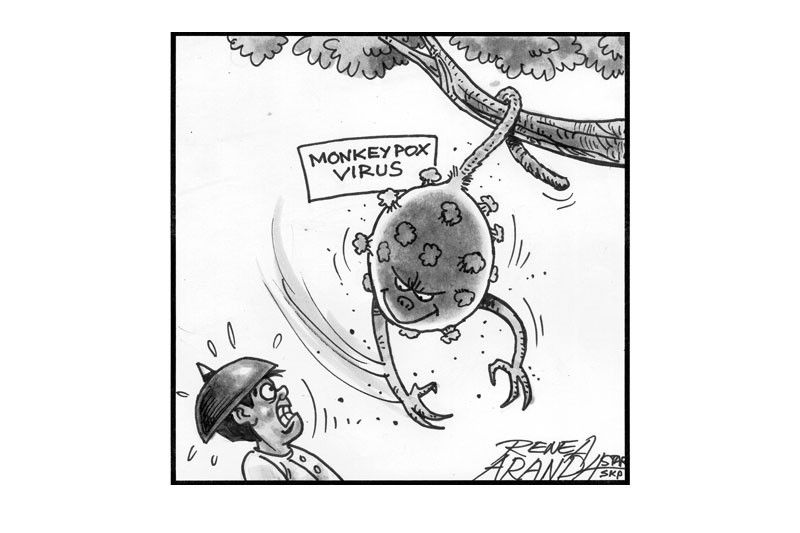EDITORIAL - Bracing for monkeypox

Here’s another reason to continue observing COVID safety protocols: health experts say the same measures are the best defenses against monkeypox, the latest viral disease now spreading in countries where it is not endemic.
First identified in monkeys in a Danish laboratory in 1958, monkeypox is less contagious than COVID-19. Transmission requires close and prolonged physical and sexual contact especially through lesions, the transfer of body fluids, contact with infected respiratory droplets as well as with contaminated materials such as bedding.
The World Health Organization prescribes preventive measures that are the same as those for COVID: masking, handwashing, disinfection of surfaces that are frequently touched, respiratory etiquette, distancing and avoidance of large gatherings. No deaths have been reported yet in the monkeypox outbreak, but the disease can be serious for children, pregnant women and the immunecompromised.
No monkeypox case has been reported in the Philippines so far. Considering the country’s open borders, however, it could be just a matter of time before monkeypox is detected here. A monkeypox vaccine and one specific treatment were approved in 2019 and this year, respectively, but these are not yet widely available.
In the meantime, the WHO has advised governments and the public to be on alert for symptoms of monkeypox. These include an atypical rash that progresses into pustules similar to smallpox and then to scabs, with possible fever, back pain, muscle ache and enlarged lymph nodes. Until the scabs have fallen off and a fresh skin layer has formed, physical contact and sexual acts with the patient are discouraged.
The Bureau of Quarantine has announced that it would begin symptoms screening for travelers from countries where monkeypox has been reported. Travelers with symptoms must undergo quarantine for one or two weeks.
As of May 21, there were 92 laboratory-confirmed cases and 28 suspected in 12 countries where the virus is not endemic, with the highest numbers reported in Portugal, Spain and the United Kingdom, and Canada reporting a high number of suspected cases. Also with confirmed cases are Australia, Belgium, France, Germany, Italy, the Netherlands, Sweden and the United States.
As the WHO has again warned, the COVID pandemic is “most certainly not over.” Filipinos are familiar with the COVID safety protocols, and should continue strictly observing these to prevent the spread of yet another potentially deadly viral disease.
- Latest
- Trending


























